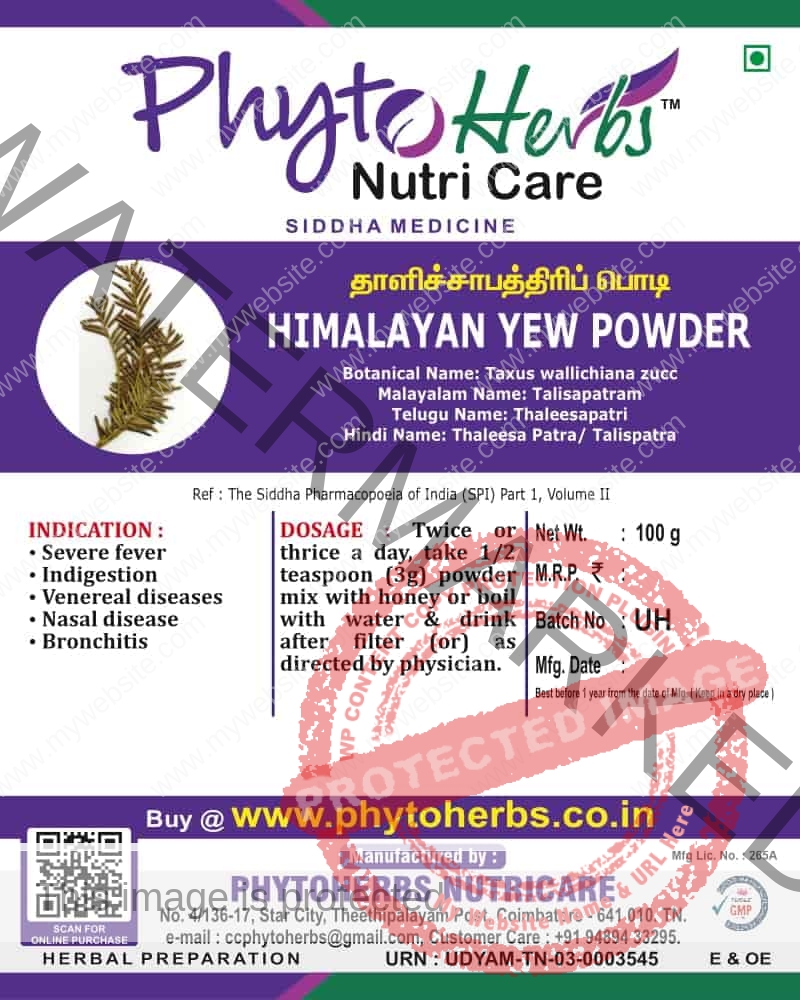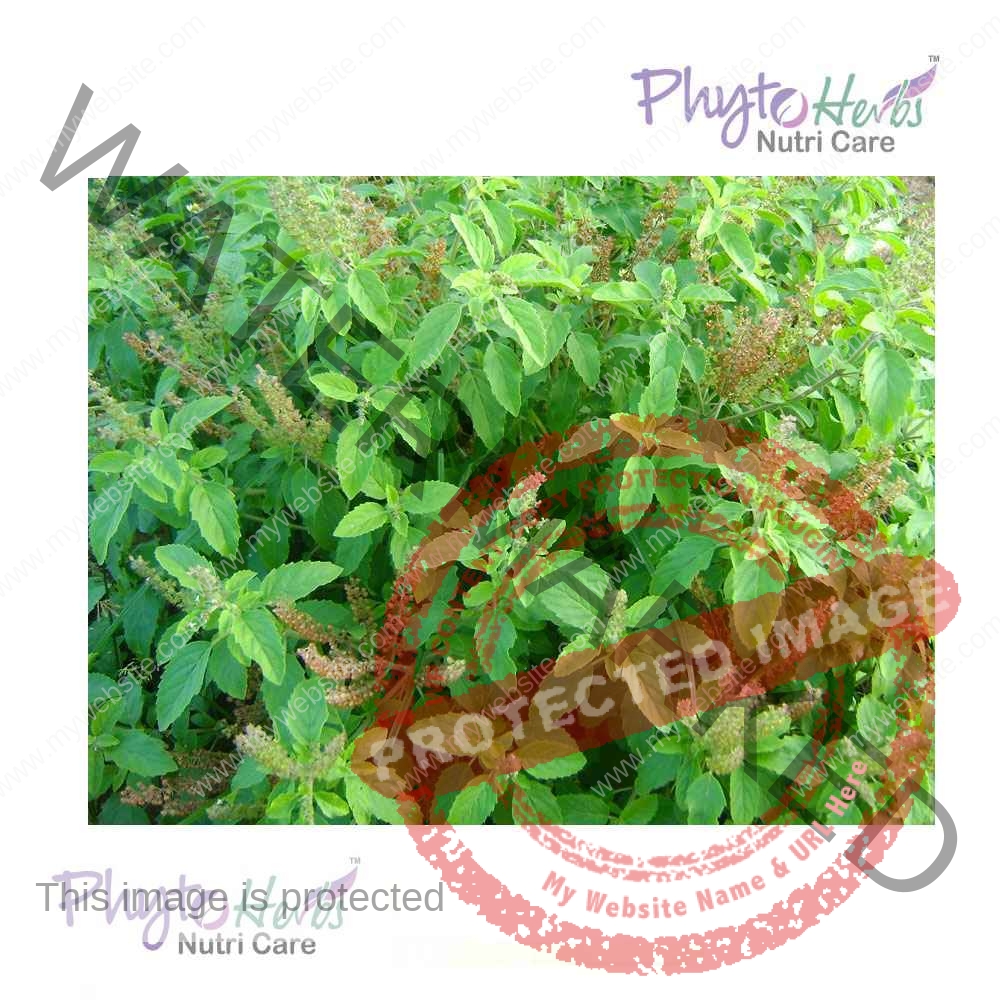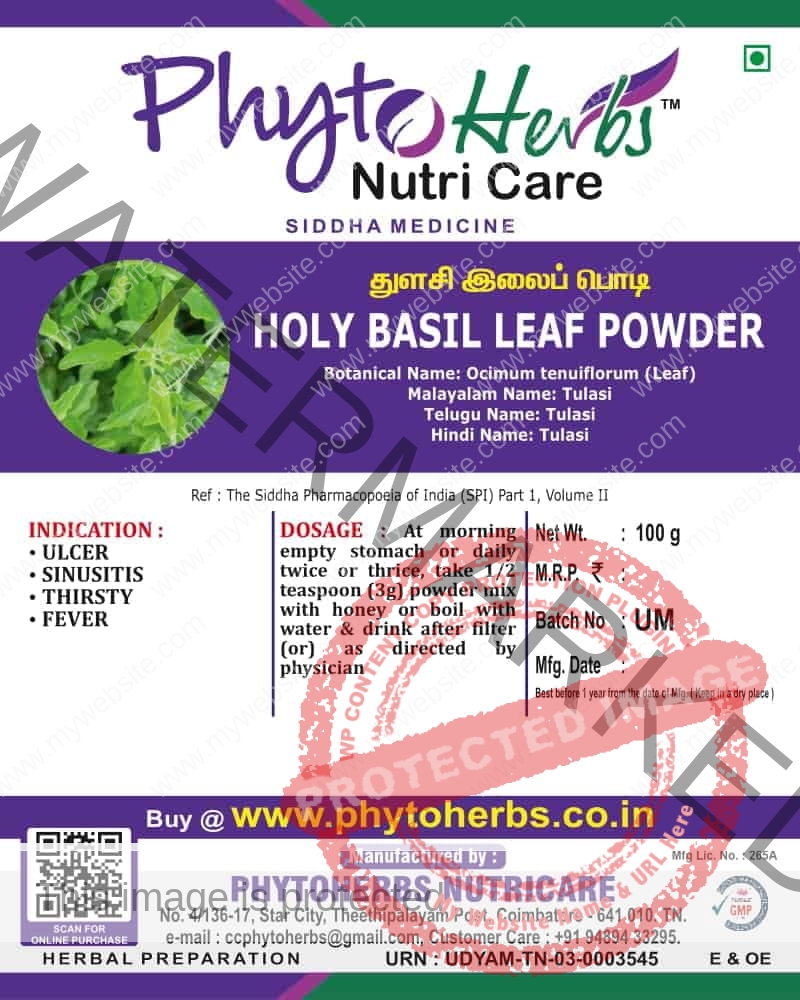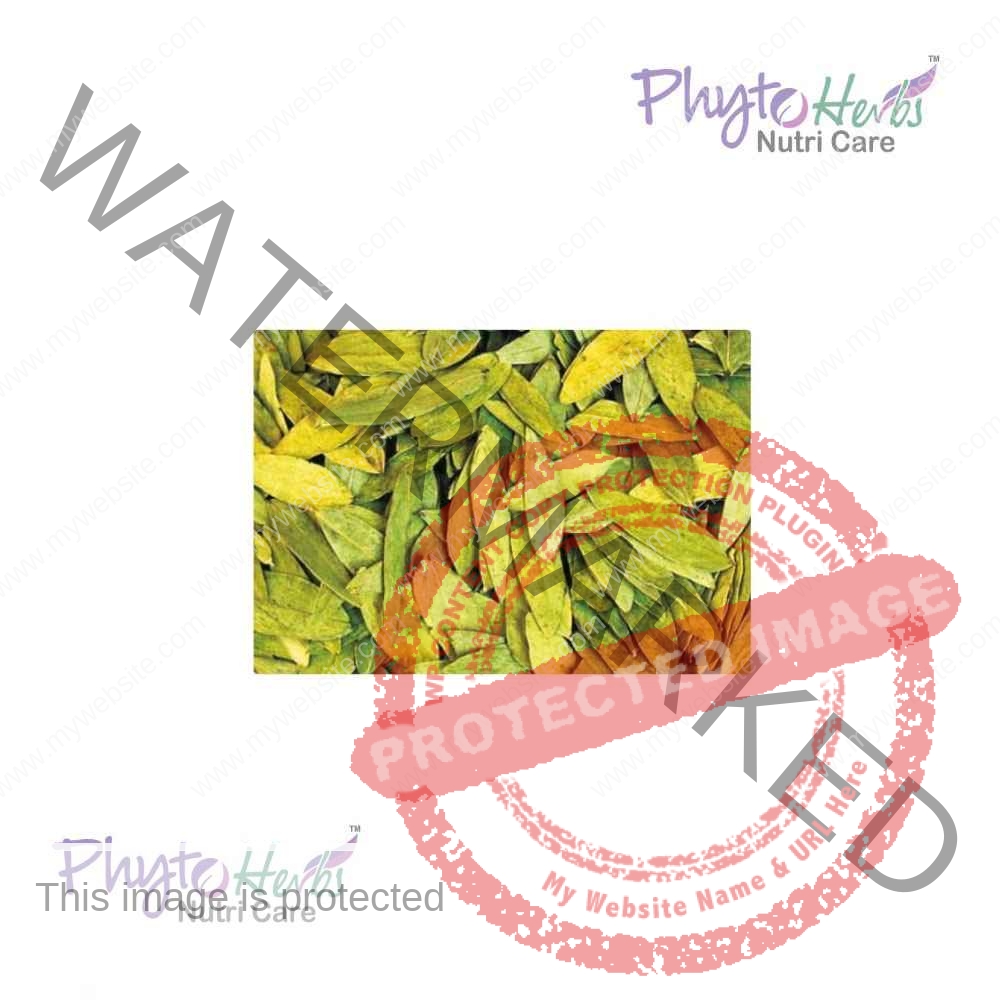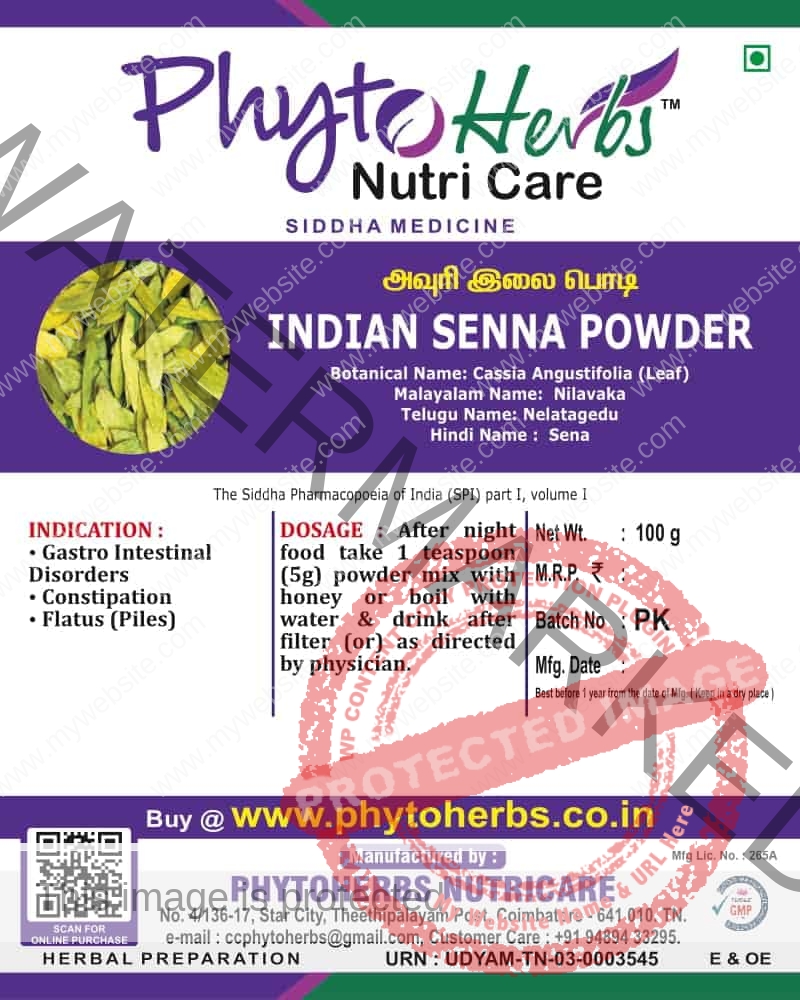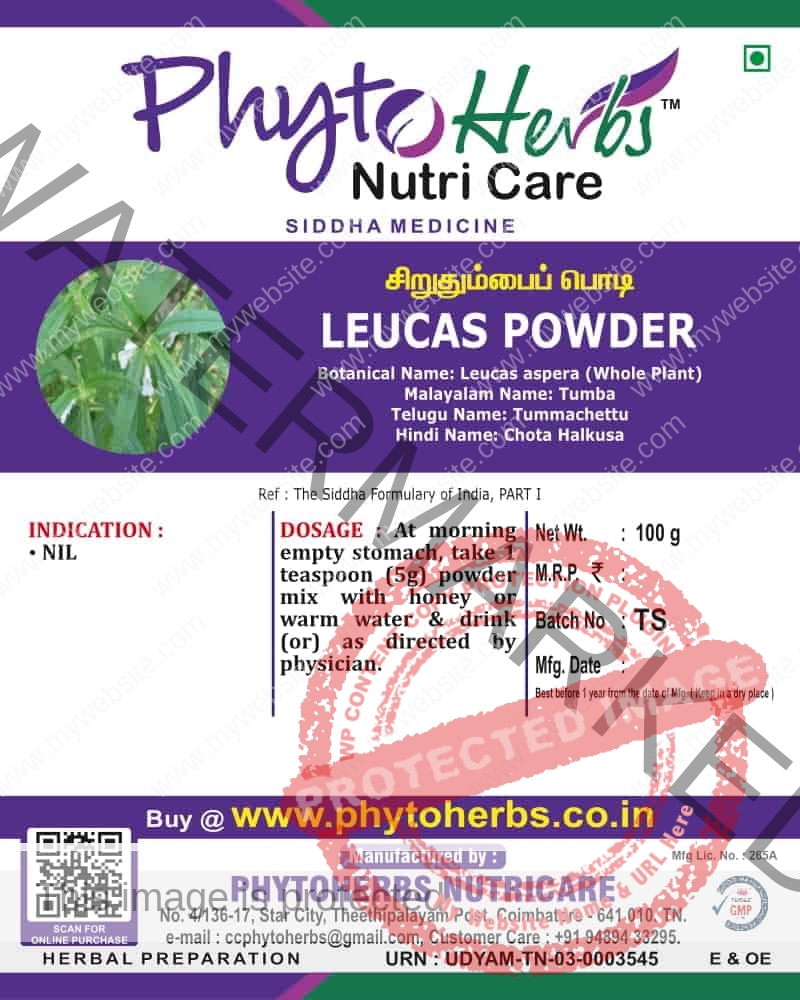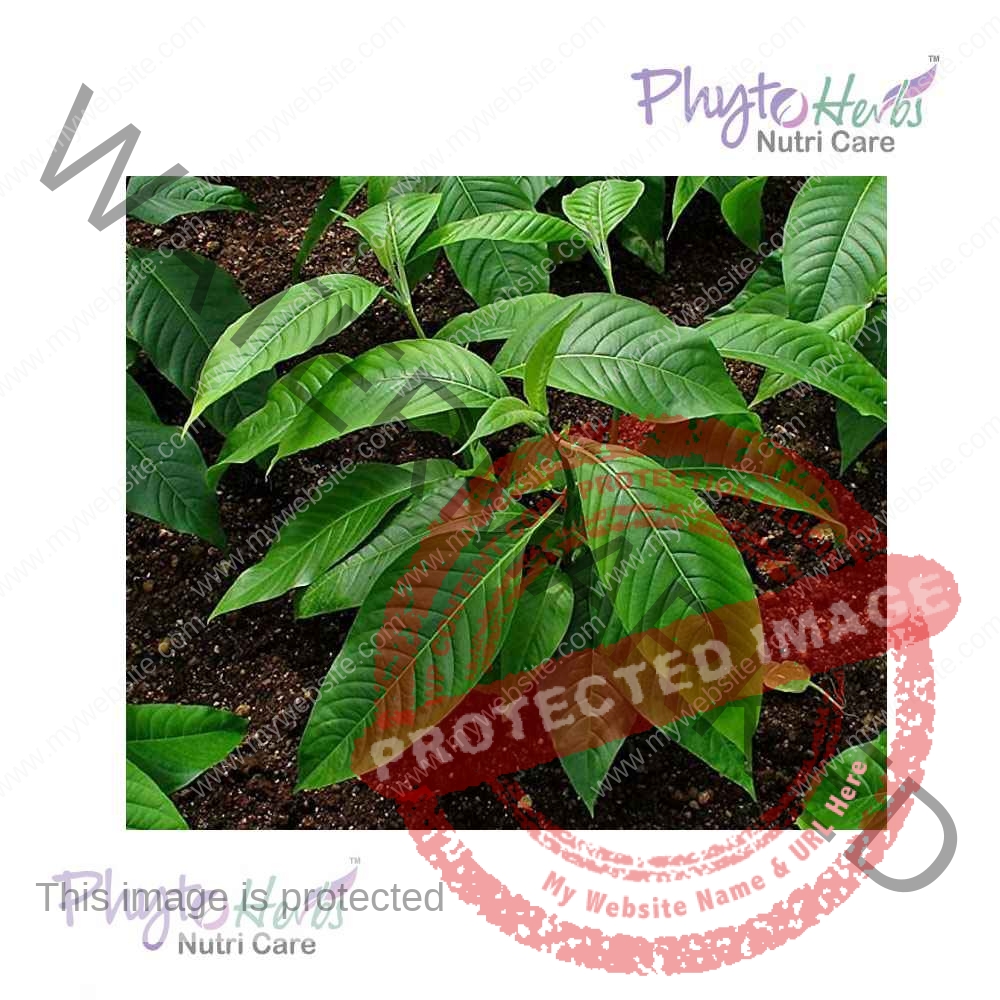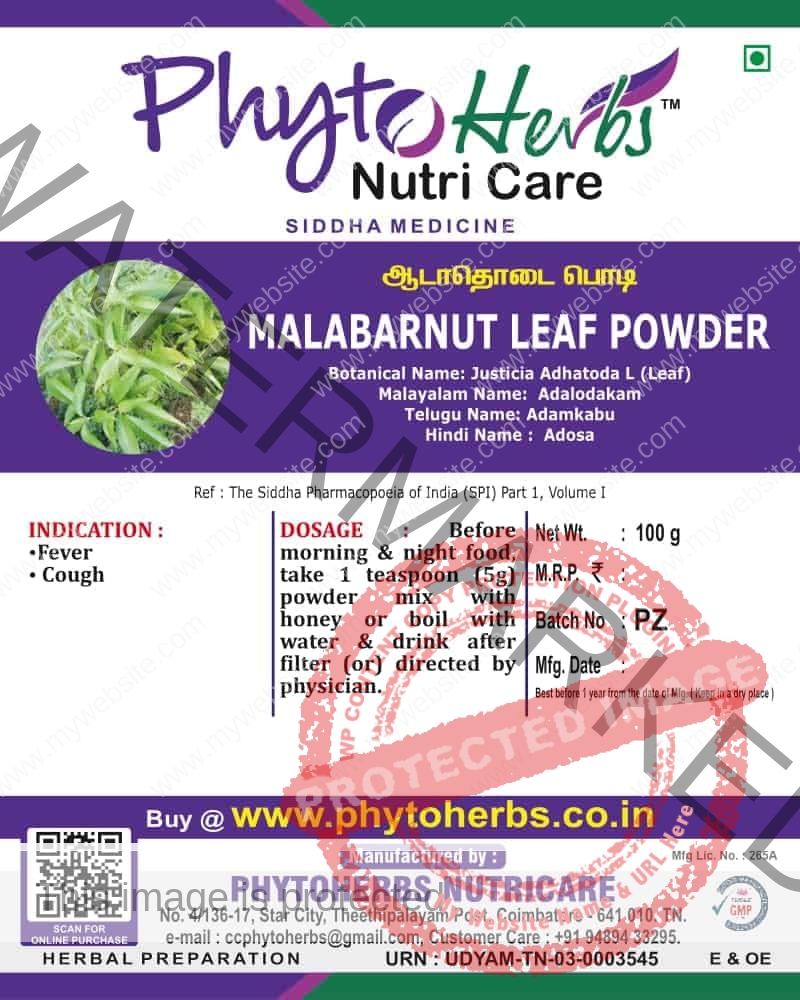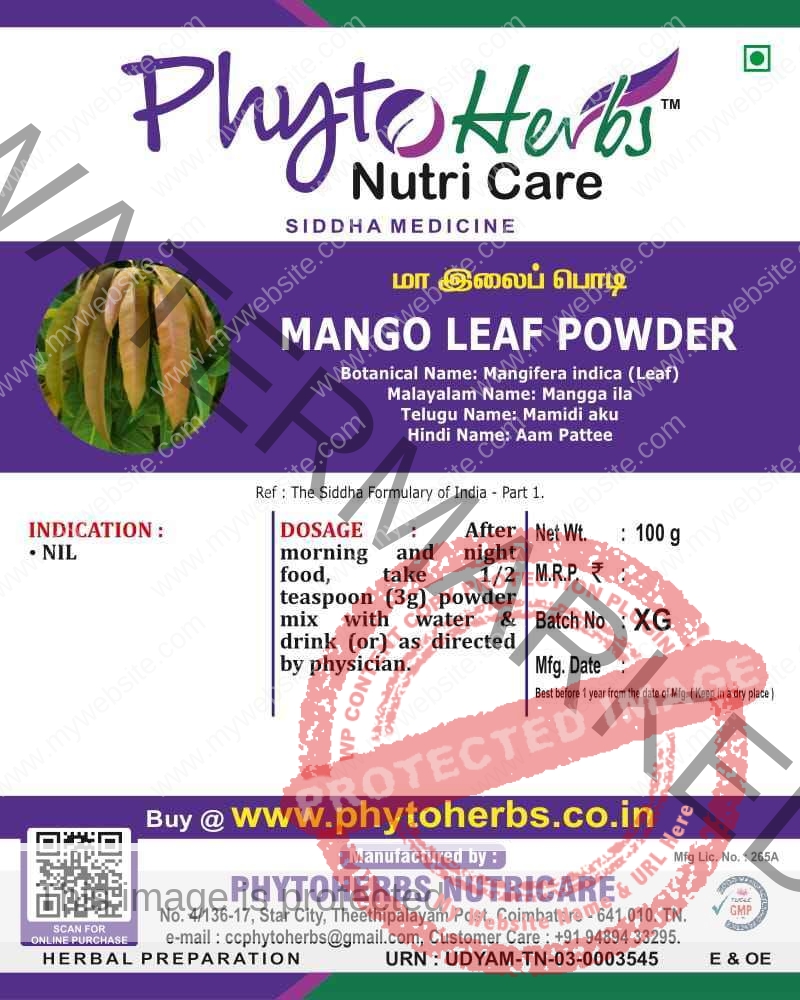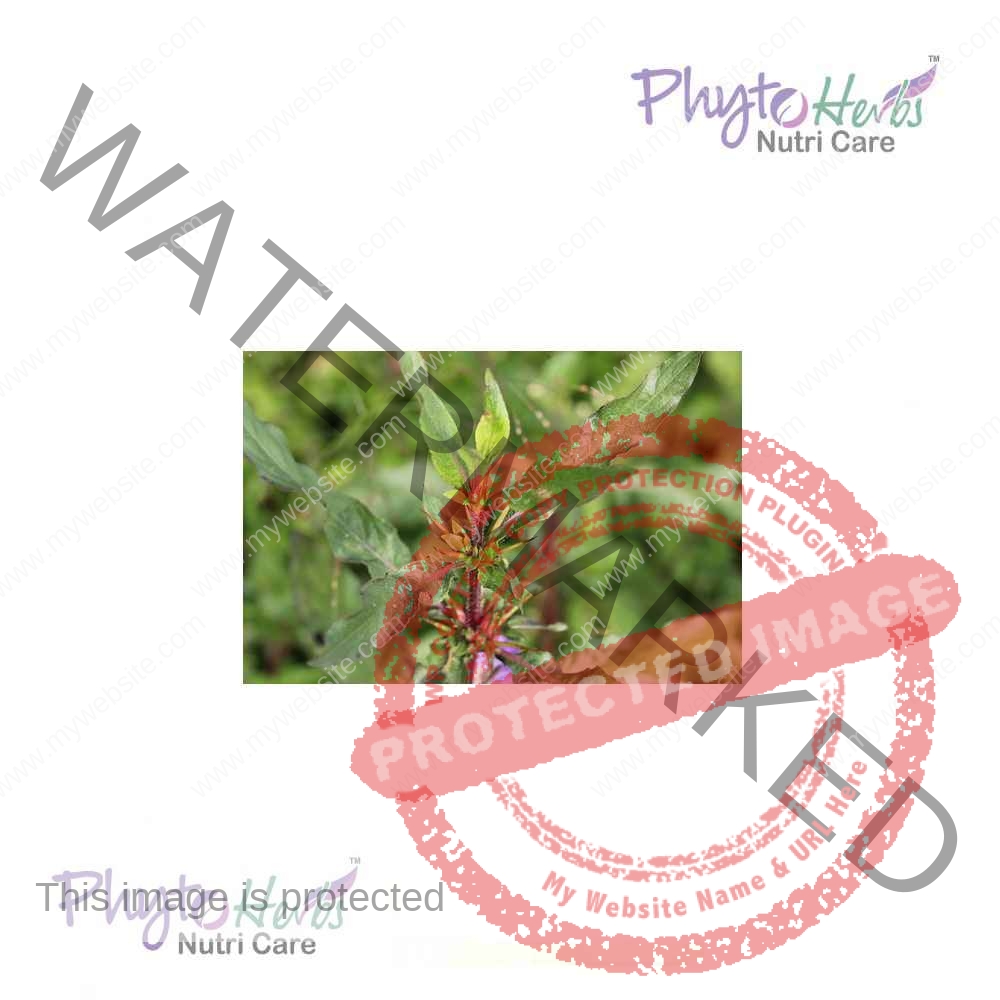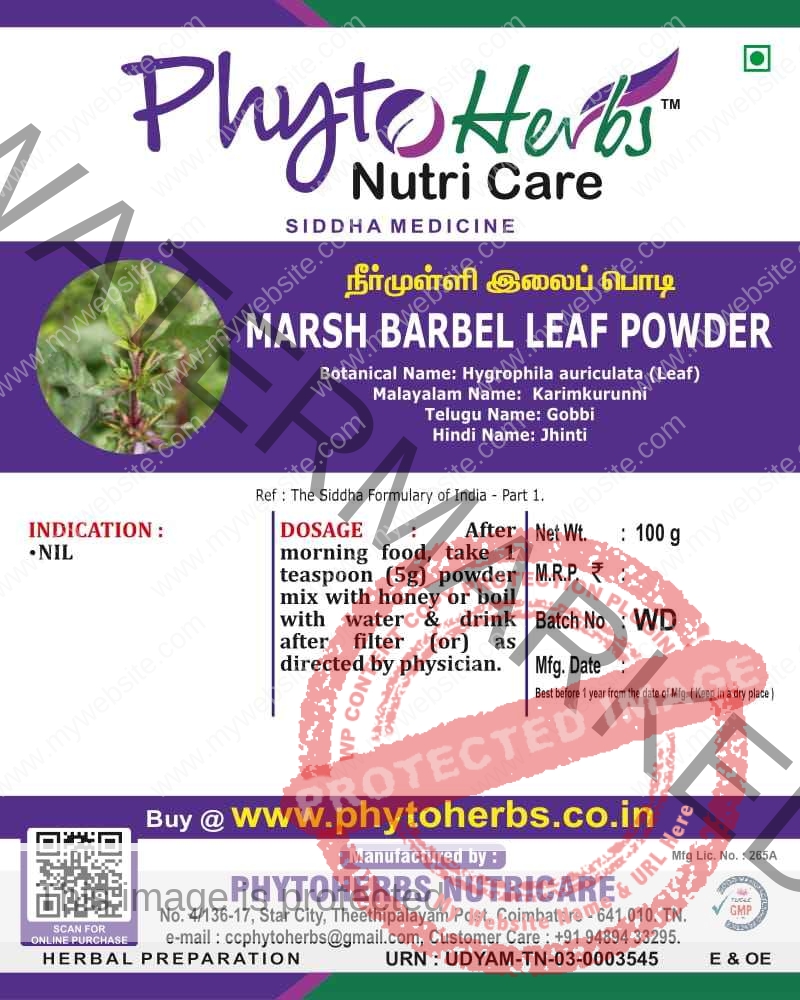Showing 25–36 of 50 results
Show filter-
Himalayan Yew Powder / தாளிசபத்திரி பொடி
₹100.00 – ₹500.00Botanical Name: Taxus wallichiana zucc
Tamil Name: தாளிசபத்திரி பொடி / Thaleesapatri Podi
Malayalam Name: താലീസപത്രം / Talisapatram
Telugu Name: టాలీసపత్రి / Thaleesapatri
Hindi Name: तालीस पत्र / तालीसपत्र / Thaleesa Patra/ TalispatraDescription:
Himalayan Yew (Taxus wallichiana) is an ever green tree belonging to family Taxaceae and genus Taxa.
Traditional Uses: The leaves of T. wallichiana are considered to have emmenagogue, sedative, antiseptic, aphrodisiac and antispasmodic properties. It is employed in the treatment of hysteria, epilepsy and nervousness. The major active compounds extracted from the leaves of this plant are buccatin and Taxol, which are used in the treatment of uterine (ovarian), breast and colon cancers. Also, Himalayan Yew has a wide variety of traditional medicinal uses. It has been utilized to cure of high fever and chronic inflammatory diseases. Its decoctions, juice, and herbal tea are consumed to cure epilepsy, cough, cold, indigestion, and respiratory infections. Various part of T. wallichiana such as bark and leaves are employed in Unani medicine (Zarnab); a sedative and aphrodisiac drug which is used to cure bronchitis, asthma, snake bite, epilepsy, and scorpion stings.
Therapeutic Uses: அதிசுரம் (Severe fever), மந்தம் (Indigestion), மேக நோய் (Venereal Diseases), நாசிப்பிணி (Nasal Disease), நாள்பட்ட காயம் (Chronic Fever).Dosage: Twice or thrice a day, take 1/2 teaspoon (3g) powder mix with honey or boil with water & drink after filter (or) as directed by physician.
-
Himalayan Yew Powder / தாளிசபத்திரி பொடி
₹45.00Botanical Name: Taxus wallichiana zucc
Tamil Name: தாளிசபத்திரி பொடி / Thaleesapatri Podi
Malayalam Name: താലീസപത്രം / Talisapatram
Telugu Name: టాలీసపత్రి / Thaleesapatri
Hindi Name: तालीस पत्र / तालीसपत्र / Thaleesa Patra/ TalispatraDescription: Himalayan Yew (Taxus wallichiana) is an ever green tree belonging to family Taxaceae and genus Taxa.
Traditional Uses: The leaves of T. wallichiana are considered to have emmenagogue, sedative, antiseptic, aphrodisiac and antispasmodic properties. It is employed in the treatment of hysteria, epilepsy and nervousness. The major active compounds extracted from the leaves of this plant are buccatin and Taxol, which are used in the treatment of uterine (ovarian), breast and colon cancers. Also, Himalayan Yew has a wide variety of traditional medicinal uses. It has been utilized to cure of high fever and chronic inflammatory diseases. Its decoctions, juice, and herbal tea are consumed to cure epilepsy, cough, cold, indigestion, and respiratory infections. Various part of T. wallichiana such as bark and leaves are employed in Unani medicine (Zarnab); a sedative and aphrodisiac drug which is used to cure bronchitis, asthma, snake bite, epilepsy, and scorpion stings.
Therapeutic Uses: அதிசுரம் (Severe fever), மந்தம் (Indigestion), மேக நோய் (Venereal Diseases), நாசிப்பிணி (Nasal Disease), நாள்பட்ட காயம் (Chronic Fever).
Dosage: Twice or thrice a day, take 1/2 teaspoon (3g) powder mix with honey or boil with water & drink after filter (or) as directed by physician.
-
Holy Basil Leaf Powder / துளசிஇலைப் பொடி
₹35.00Botanical Name: Ocimum tenuiflorum (Leaf)
Tamil Name: துளசிஇலைப் பொடி / Tulasi Ilai Podi
Malayalam Name: തുളസി / Tuḷasi
Telugu Name: తులసి / Tulasi
Hindi Name: तुलसी / TulsiDescription: Tulsi or Holy Basil (Ocimum tenuiflorum) is pungent and bitter in taste, pungent in the post digestive effect and has hot potency. The roots, leaves and seeds of Tulsi possess several medicinal properties. Ayurvedic texts categorise Tulsi as stimulant, aromatic and antipyretic. It has a variety of biological / pharmacological activities such as antibacterial, antiviral, antifungal, anti protozoal, anti malarial, anthelmentic, anti diarrhoeal, analgesic, antipyretic, anti inflammatory, anti allergic, antihypertensive, cardio protective, central nervous system (CNS) depressant, memory enhancer, antihypercholesterolaemic, hepatoprotective, anti diabetic, anti asthmatic, anti thyroidic, antioxidant, anticancer, chemopreventive, radio protective, immunomodulatory, anti fertility, antiulcer, anti arthritic, adaptogenic / anti stress, anti cataract, anti leucodermal and anticoagulant activities. Its leaves are helpful in sharpening memory and in curing fever and common cold.
Traditional Uses: Different parts of the plant are used in Ayurveda and Siddha systems of medicine for prevention and cure of many illnesses and everyday ailments like common cold, headache, cough, influenza, earache, fever, colic pain, sore throat, bronchitis, asthma, hepatic diseases, malarial fever, as an antidote for snake bite and scorpion sting, flatulence, migraine headaches, fatigue, skin diseases, wound, insomnia, arthritis, digestive disorders, night blindness and diarrhoea. The leaves are good for nerves and to sharpen memory. Chewing of tulsi leaves also cures ulcers and infections of mouth. A few leaves dropped in drinking water or food stuff can purify it and can kill germs in it. Holy Basil is so good for boosting up the immune system. It protects from nearly all sorts of infections from viruses, bacteria, fungi and protozoa.
Therapeutic Uses: சூலை நோய் (Painful diseases), கரும் புள்ளி (Black spot), மேக அனல், மேக நோய் (Venereal diseases), வெண்குட்டம் (Leucoderma).
Dosage: At morning empty stomach or daily twice or thrice, take ½ teaspoon (3g) powder mix with honey or boil with water & drink after filter (or) as directed by physician.
-
Holy Basil Leaf Powder / துளசிஇலைப் பொடி
₹80.00 – ₹400.00Botanical Name: Ocimum tenuiflorum (Leaf)
Tamil Name: துளசிஇலைப் பொடி / Tulasi Ilai Podi
Malayalam Name: തുളസി / Tuḷasi
Telugu Name: తులసి / Tulasi
Hindi Name: तुलसी / TulsiDescription:
Tulsi or Holy Basil (Ocimum tenuiflorum) is pungent and bitter in taste, pungent in the post digestive effect and has hot potency. The roots, leaves and seeds of Tulsi possess several medicinal properties. Ayurvedic texts categorise Tulsi as stimulant, aromatic and antipyretic. It has a variety of biological / pharmacological activities such as antibacterial, antiviral, antifungal, anti protozoal, anti malarial, anthelmentic, anti diarrhoeal, analgesic, antipyretic, anti inflammatory, anti allergic, antihypertensive, cardio protective, central nervous system (CNS) depressant, memory enhancer, antihypercholesterolaemic, hepatoprotective, anti diabetic, anti asthmatic, anti thyroidic, antioxidant, anticancer, chemopreventive, radio protective, immunomodulatory, anti fertility, antiulcer, anti arthritic, adaptogenic / anti stress, anti cataract, anti leucodermal and anticoagulant activities. Its leaves are helpful in sharpening memory and in curing fever and common cold.
Traditional Uses: Different parts of the plant are used in Ayurveda and Siddha systems of medicine for prevention and cure of many illnesses and everyday ailments like common cold, headache, cough, influenza, earache, fever, colic pain, sore throat, bronchitis, asthma, hepatic diseases, malarial fever, as an antidote for snake bite and scorpion sting, flatulence, migraine headaches, fatigue, skin diseases, wound, insomnia, arthritis, digestive disorders, night blindness and diarrhoea. The leaves are good for nerves and to sharpen memory. Chewing of tulsi leaves also cures ulcers and infections of mouth. A few leaves dropped in drinking water or food stuff can purify it and can kill germs in it. Holy Basil is so good for boosting up the immune system. It protects from nearly all sorts of infections from viruses, bacteria, fungi and protozoa.
Therapeutic Uses: சூலை நோய் (Painful diseases), கரும் புள்ளி (Black spot), மேக அனல், மேக நோய் (Venereal diseases), வெண்குட்டம் (Leucoderma).Dosage: At morning empty stomach or daily twice or thrice, take ½ teaspoon (3g) powder mix with honey or boil with water & drink after filter (or) as directed by physician.
-
Indian Senna Powder / அவுரி இலைப்பொடி
₹60.00 – ₹300.00Botanical Name: Cassia Angustifolia (Leaf)
Tamil Name: அவுரி இலைப்பொடி / Avuri ilaip Podi
Malayalam Name: നിലാവക / Nilavaka
Telugu Name: నెలతాగేడు / Nelatagedu
Hindi Name: सेना / SenaTherapeutic Indication:
குன்ம நோய் (Painful gastro intestinal disorders with indigestion), மலக்கட்டு (Constipation), மூலவாய்வு (Flatus). Cassia angustifolia (senna), a native plant of Yemen, Somalia and Arabia and now cultivated in other parts of the world including India. It has a variety of medicinal uses in Ayurveda, Siddha, Unani as well as other traditional systems of medicine. It has been recommended for constipation, piles, epilepsy, respiratory diseases, skin infections, migraine and heart diseases.
Direction: After night food, take 1 teaspoon (5g) powder mix with honey or boil with water & drink after filter (or) as directed by physician.
-
Indian Senna Powder / அவுரி இலைப்பொடி
₹30.00Botanical Name: Cassia Angustifolia (Leaf)
Tamil Name: அவுரி இலைப்பொடி / Avuri ilaip Podi
Malayalam Name: നിലാവക / Nilavaka
Telugu Name: నెలతాగేడు / Nelatagedu
Hindi Name: सेना / SenaTherapeutic Indication: குன்ம நோய் (Painful gastro intestinal disorders with indigestion), மலக்கட்டு (Constipation), மூலவாய்வு (Flatus). Cassia angustifolia (senna), a native plant of Yemen, Somalia and Arabia and now cultivated in other parts of the world including India. It has a variety of medicinal uses in Ayurveda, Siddha, Unani as well as other traditional systems of medicine. It has been recommended for constipation, piles, epilepsy, respiratory diseases, skin infections, migraine and heart diseases.
Direction: After night food, take 1 teaspoon (5g) powder mix with honey or boil with water & drink after filter (or) as directed by physician.
-
Leucas Powder / சிறுதும்பைப் பொடி
₹50.00 – ₹250.00Botanical Name: Leucas aspera (Whole Plant)
Tamil Name: சிறுதும்பைப் பொடி / Siruthumbai Podi
Malayalam Name: തുമ്പ / Tumba
Telugu Name: తుమ్మచెట్టు / Tummachettu
Hindi Name: छोटा हलकुसा / Chota HalkusaDescription:
Vitex negundo belongs to the family Verbanaceae which comprises of 5 Genera and nearly 250 species which is commonly known as five leaved chaste tree. The leaves are most potent for medicinal use. Traditional Uses: Vitex negundo has been used to several ailment such as inflammation, eye disease, toothache, ulcers, fever, asthma, headache, digestion problems, sinuses, bronchitis, antibacterial, antipyretic, antihistaminic, analgesic, insecticidal, antidote for snake bite, etc. The leaves of these plants have been shown mosquito repellent effects as well as ant. The plant also found to have anticancer, rheumatoid arthritis healing and hepatoprotective potentials. The leaves are used for treatment inflammation, skin-ulcers, gonorrhoea, and bronchitis. Pharmocological properties: Oral administration of the leaves claims to have antihyperglycemic, antibacterial, antipyretic, antihistaminic agents, anti-implantation activity. Therapeutic Uses: அழல் சுவாசம், நாசிப் பிணி (Nasal disease), வலி (Pain).Dosage: After morning food, take 1 teaspoon (5g) powder mix with honey or water & drink (or) as directed by physician.
-
MalabarNut Leaf Powder / ஆடாதொடை இலைப்பொடி
₹60.00 – ₹300.00Botanical Name: Justicia Adhatoda L (Leaf)
Tamil Name: ஆடாதொடை இலைப்பொடி / Aadhathodai Ilai Podi
Malayalam Name: ആടലോടകം / Adalodakam
Telugu Name: టంకాబు / Adamkabu
Hindi Name: अदोस / AdosaDescription:
Justicia Adhatoda is a well known plant drug in Ayurvedic, Siddha and Unani medicines. It possesses some medicinal properties. It has been used for the treatment of various diseases and disorders, particularly for the respiratory tract ailments. It is one of the primary herb of the Ayurvedic system used in the treatment of cough, bronchitis, asthma and symptoms of common cold. The source of the drug ‘Vasaka’ is well known in the indigenous system of medicine for its beneficial effects, particularly in bronchitis. There are various herbal formulations accessible for the treatment of various kinds of respiratory disorders by using Adhatoda.
Therapeutic Uses: இரைப்பு (Asthma), இரத்தகடுப்பு (Dysentery), குன்மம் (Painful gastro intestinal disorder).Dosage: Before morning & night food, take 1 teaspoon (5g) powder mix with honey or boil with water & drink after filter (or) as directed by physician. Dosage: Before morning & night food, take 1 teaspoon (5g) powder mix with honey or boil with water & drink after filter (or) as directed by physician.
-
MalabarNut Leaf Powder / ஆடாதொடை இலைப்பொடி
₹25.00Botanical Name: Justicia Adhatoda L (Leaf)
Tamil Name: ஆடாதொடை இலைப்பொடி / Aadhathodai Ilai Podi
Malayalam Name: ആടലോടകം / Adalodakam
Telugu Name: టంకాబు / Adamkabu
Hindi Name: अदोस / AdosaDescription: Justicia Adhatoda is a well known plant drug in Ayurvedic, Siddha and Unani medicines. It possesses some medicinal properties. It has been used for the treatment of various diseases and disorders, particularly for the respiratory tract ailments. It is one of the primary herb of the Ayurvedic system used in the treatment of cough, bronchitis, asthma and symptoms of common cold. The source of the drug ‘Vasaka’ is well known in the indigenous system of medicine for its beneficial effects, particularly in bronchitis. There are various herbal formulations accessible for the treatment of various kinds of respiratory disorders by using Adhatoda.
Therapeutic Uses: இரைப்பு (Asthma), இரத்தகடுப்பு (Dysentery), குன்மம் (Painful gastro intestinal disorder). Dosage: Before morning & night food, take 1 teaspoon (5g) powder mix with honey or boil with water & drink after filter (or) as directed by physician.
Dosage: Before morning & night food, take 1 teaspoon (5g) powder mix with honey or boil with water & drink after filter (or) as directed by physician.
-
Mango Leaf Powder / மா இலைப் பொடி
₹50.00 – ₹250.00Botanical Name: Mangifera indica (Leaf)
Tamil Name: மா இலைப் பொடி / Maa ilai Podi
Malayalam Name: മാങ്ങാ ഇല / Mangga ila
Telugu Name: మామిడి ఆకు / Mamidi aku
Hindi Name: आम पत्ती / Aam PatteeDescription: The Mango (Mangifera indica) is one of the most important tropical plants. Mangifera indica is a species of mango in the Anacardiaceae family. Traditional Uses: Various parts of plant are used as a dentrifrice, antiseptic, astringent, diaphoretic, stomachic, vermifuge, tonic, laxative and diuretic and to treat diarrhea, dysentery, anaemia, asthma, bronchitis, cough, hypertension, insomnia, rheumatism, toothache, leucorrhoea, haemorrhage and piles. All parts are used to treat abscesses, broken horn, rabid dog or jackal bite, tumour, snakebite, stings, datura poisoning, heat stroke, miscarriage, anthrax, blisters, wounds in the mouth, tympanitis, colic, diarrhea, glossitis, indigestion, bacillosis, bloody dysentery, liver disorders, excessive urination, tetanus and asthma. Decoction of mango kernel is used, for example, in the treatment of diarrhea, haemorrhages, and bleeding haemorrhoids for its vermifuge and astringent properties, extracts of unripe fruit, bark and leaves are used for their antibiotic activity, while an aqueous stem bark extract from Mangifera indica is used in Cuba as a remedy for diarrhoea, fever, gastritis, and ulcers.
Description:
The Mango (Mangifera indica) is one of the most important tropical plants. Mangifera indica is a species of mango in the Anacardiaceae family.
Traditional Uses: Various parts of plant are used as a dentrifrice, antiseptic, astringent, diaphoretic, stomachic, vermifuge, tonic, laxative and diuretic and to treat diarrhea, dysentery, anaemia, asthma, bronchitis, cough, hypertension, insomnia, rheumatism, toothache, leucorrhoea, haemorrhage and piles. All parts are used to treat abscesses, broken horn, rabid dog or jackal bite, tumour, snakebite, stings, datura poisoning, heat stroke, miscarriage, anthrax, blisters, wounds in the mouth, tympanitis, colic, diarrhea, glossitis, indigestion, bacillosis, bloody dysentery, liver disorders, excessive urination, tetanus and asthma. Decoction of mango kernel is used, for example, in the treatment of diarrhea, haemorrhages, and bleeding haemorrhoids for its vermifuge and astringent properties, extracts of unripe fruit, bark and leaves are used for their antibiotic activity, while an aqueous stem bark extract from Mangifera indica is used in Cuba as a remedy for diarrhoea, fever, gastritis, and ulcers. Dosage: After morning and night food, take 1/2 teaspoon (3g) powder mix with water & drink (or) as directed by physician.After morning and night food, take 1/2 teaspoon (3g) powder mix with water & drink (or) as directed by physician. -
Mango Leaf Powder / மா இலைப் பொடி
₹25.00Botanical Name: Mangifera indica (Leaf)
Tamil Name: மா இலைப் பொடி / Maa ilai Podi
Malayalam Name: മാങ്ങാ ഇല / Mangga ila
Telugu Name: మామిడి ఆకు / Mamidi aku
Hindi Name: आम पत्ती / Aam PatteeDescription: The Mango (Mangifera indica) is one of the most important tropical plants. Mangifera indica is a species of mango in the Anacardiaceae family.
Traditional Uses: Various parts of plant are used as a dentrifrice, antiseptic, astringent, diaphoretic, stomachic, vermifuge, tonic, laxative and diuretic and to treat diarrhea, dysentery, anaemia, asthma, bronchitis, cough, hypertension, insomnia, rheumatism, toothache, leucorrhoea, haemorrhage and piles. All parts are used to treat abscesses, broken horn, rabid dog or jackal bite, tumour, snakebite, stings, datura poisoning, heat stroke, miscarriage, anthrax, blisters, wounds in the mouth, tympanitis, colic, diarrhea, glossitis, indigestion, bacillosis, bloody dysentery, liver disorders, excessive urination, tetanus and asthma. Decoction of mango kernel is used, for example, in the treatment of diarrhea, haemorrhages, and bleeding haemorrhoids for its vermifuge and astringent properties, extracts of unripe fruit, bark and leaves are used for their antibiotic activity, while an aqueous stem bark extract from Mangifera indica is used in Cuba as a remedy for diarrhoea, fever, gastritis, and ulcers.
Dosage: After morning and night food, take 1/2 teaspoon (3g) powder mix with water & drink (or) as directed by physician.
-
Marsh Barbel Leaf Powder / நீர்முள்ளி இலைப் பொடி
₹70.00 – ₹350.00Botanical Name: Hygrophila auriculata (Leaf)
Tamil Name: நீர்முள்ளி இலைப் பொடி / Neermulli Ilai Podi
Malayalam Name: കരിങ്കുറഞ്ഞി / Karimkurunni
Telugu Name: గొబ్బి / Gobbi
Hindi Name: झिण्टी / JhintiDescription:
Hygrophila auriculata or Marsh Barbel (English) is commonly used to call in Tamil as a Neermulli. An annual herbal plant grows up to 60cms altitude. The plant stem is tetragonal, hairy and stiffened at the nodes. The bark is dark brown, although the leaves are elliptic-lanceolate and hispid. The flowers are violet and somewhat purple-blue. Therapeutically, it is useful in inflammation, calculus, hyperactive thirst, diarrhea, poisoning, pain, anemia, abdominal disorders, flatulence, urine retention, burning sensation, rheumatoid arthritis, Prameha, vision disorders, and blood disorders.
Medicinal Uses: Its leaf is useful in a cough. Also useful for anal fistula. Its seed is useful in blood disorders. Intake of root decoction is useful for jaundice. Its vegetable is useful in anemia. Neermulli’s root and a whole part decoction are useful in rheumatoid arthritis.
Pharmacological Activities: It has various pharmocological activities viz., aphrodisiac, liver protecting, hypoglycemic, hematopoietic, antioxidant and neuroprotective.Dosage: After morning food, take 1 teaspoon (5g) powder mix with honey or warm water & drink after filter (or) as directed by physician.



